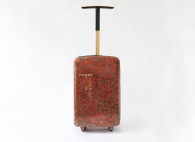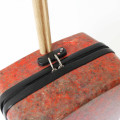 A young New Zealand designer found inspiration for an innovative product in an industry that has deep historical roots in his country: sheep farming. In researching the wool value chain, Daniel Mclaughlin identified high volumes of post-industrial and post-consumer waste as a space for potential innovation, extending the applicability and longevity of woolen product before it eventually becomes composted as part of the eco cycle. His “Biowool” is the output from materials exploration focused on adding value to coarse wool.
A young New Zealand designer found inspiration for an innovative product in an industry that has deep historical roots in his country: sheep farming. In researching the wool value chain, Daniel Mclaughlin identified high volumes of post-industrial and post-consumer waste as a space for potential innovation, extending the applicability and longevity of woolen product before it eventually becomes composted as part of the eco cycle. His “Biowool” is the output from materials exploration focused on adding value to coarse wool.
“Sheep farming is one of the primary cornerstones of the New Zealand economy. Processes unique to New Zealand wool farming date back to the inception of the country. Wool prices are historically volatile, and traditionally farmers have focused on farming and had limited control of their product after it was sold. Farming is undergoing a renaissance to modernize processes. In line with this trend, Biowool is my remote contribution to the farming community,” McLaughlin says.
McLaughlin believes that it has wide potential for application. As a sample, he has designed the “Terracase,” a hard-shell suitcase made from recycled carpets and bio-resin derived from rapeseed oil. As showcased in the Terracase luggage range, Biowool introduces new standards in luggage design—from traceability of materials to source, to total product authenticity.
The project was entered in the James Dyson Award design competition. 2013 finalists will be announced Sept. 12; the winner announcement is Nov. 7. The international competition is run by the James Dyson Foundation as part of its mission to inspire young people about design engineering. It is open to product design, industrial design and engineering university level students who have studied in select countries.
 TEXTILES.ORG
TEXTILES.ORG



